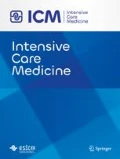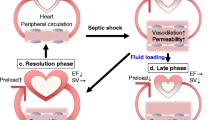Abstract
Objective
Inducible heat shock protein 72 (HSP 72) preserves myocardial function and prevents apoptosis. We investigated the expression and localization of HSP 72 and apoptosis in our previously described new model of multiple organ failure.
Design
Eighteen adult-instrumented sheep and three healthy controls were randomly assigned to one of three groups: (a) norfenefrine-masked hypovolemia plus endotoxemia (NMH+ENDO); (b) norfenefrine-masked hypovolemia without endotoxemia (NMH); (c) recurrent endotoxemia during normovolemia (ENDO); and (d) normovolemia without endotoxemia (CONTROLS).
Measurements and results
Hearts were analyzed by light microscopy, Western blots, immunohistochemistry, and TUNEL staining. HSP 72 expression was approximately threefold increased in NMH+ENDO compared with the other groups (p<0.05) and was localized mainly in left ventricular cardiomyocytes. HSP 72 was elevated in animals with norfenefrine-refractory shock compared to survivors (p=0.015). TUNEL-positive cells in the left ventricle were significantly elevated in the NMH+ENDO group (p=0.05) and correlated with HSP 72 expression (r=0.51, p=0.018). HSP 72 correlated positively with heart rate (r=0.76, p<0.0001), the prefinal hourly dose of norfenefrine (r=0.88, p<0.0001), and negatively with left ventricular stroke work index (r=−0.52, p=0.028). Double staining revealed TUNEL-positive cells with and without HSP 72 expression. Micronecroses were only detectable in NMH and NMH+ENDO without intergroup difference or correlations with hemodynamics.
Conclusion
HSP 72 overexpression and apoptosis, but not necrosis, indicate cardiovascular decompensation and poor outcome during early multiple organ failure.





Similar content being viewed by others
References
Lindquist S (1986) The heat-shock response. Annu Rev Biochem 55:1151–1191
Lindquist S, Craig EA (1988) The heat-shock proteins. Annu Rev Genet 22:631–677
Georgopoulos C, Welch WJ (1994) Role of the major heat shock proteins as molecular chaperones. Annu Rev Cell Biol 9:601–634
Welch WJ (1987) The mammalian heat shock (or stress) response: a cellular defense mechanism. Adv Exp Med Biol 225:287–304
Gabai VL, Meriin AB, Mosser DD, Caron AW, Rits S, Shifrin VI, Sherman MY (1997) Hsp70 prevents activation of stress kinases. A novel pathway of cellular thermotolerance. J Biol Chem 272:18033–18037
Beere HM, Wolf BB, Cain K, Mosser DD, Mahboubi A, Kuwana T, Tailor P, Morimoto RI, Cohen GM, Green DR (2000) Heat-shock protein 70 inhibits apoptosis by preventing recruitment of procaspase-9 to the Apaf-1 apoptosome. Nat Cell Biol 2:469–475
Saleh A, Srinivasula SM, Balkir L, Robbins PD, Alnemri ES (2000) Negative regulation of the Apaf-1 apoptosome by Hsp70. Nat Cell Biol 2:476–483
Li CY, Lee JS, Ko YG, Kim JI, Seo JS (2000) Heat shock protein 70 inhibits apoptosis downstream of cytochrome c release and upstream of caspase-3 activation. J Biol Chem 275:25665–25671
Gabai VL, Mabuchi K, Mosser DD, Sherman MY (2002) Hsp72 and stress kinase c-jun N-terminal kinase regulate the bid-dependent pathway in tumor necrosis factor-induced apoptosis. Mol Cell Biol 22:3415–3424
Marber MS, Mestril R, Chi SH, Sayen MR, Yellon DM, Dillmann WH (1995) Overexpression of the rat inducible 70-kD heat stress protein in a transgenic mouse increases the resistance of the heart to ischemic injury. J Clin Invest 95:1446–1456
Radford NB, Fina M, Benjamin IJ, Moreadith RW, Graves KH, Zhao P, Gavva S, Wiethoff A, Sherry AD, Malloy CR, Williams RS (1996) Cardioprotective effects of 70-kDa heat shock protein in transgenic mice. Proc Natl Acad Sci USA 93:2339–2342
Hutter JJ, Mestril R, Tam EK, Sievers RE, Dillmann WH, Wolfe CL (1996) Overexpression of heat shock protein 72 in transgenic mice decreases infarct size in vivo. Circulation 94:1408–1411
Lau SS, Griffin TM, Mestril R (2000) Protection against endotoxemia by HSP70 in rodent cardiomyocytes. Am J Physiol Heart Circ Physiol 278:H1439–H1445
Baba HA, Schmid KW, Schmid C, Blasius S, Heinecke A, Kerber S, Scheld HH, Bocker W, Deng MC (1998) Possible relationship between heat shock protein 70, cardiac hemodynamics, and survival in the early period after heart transplantation. Transplantation 65:799–804
Hinder F, Stubbe HD, Van Aken H, Baba HA, Jahn UR, Brodner G, August C, Erren M, Booke M (2003) Early multiple organ failure after recurrent endotoxemia in the presence of vasoconstrictor-masked hypovolemia. Crit Care Med 31:903–909
Moore FA, Sauaia A, Moore EE, Haenel JB, Burch JM, Lezotte DC (1996) Postinjury multiple organ failure: a bimodal phenomenon. J Trauma 40:501–510
Hotchkiss R, Nunnally I, Lindquist S, Taulien J, Perdrizet G, Karl I (1993) Hyperthermia protects mice against the lethal effects of endotoxin. Am J Physiol Regul Integr Comp Physiol 265:R 1447–1457
Tanonaka K, Yoshida H, Toga W, Furuhama K, Takeo S (2001) Myocardial heat shock proteins during the development of heart failure. Biochem Biophys Res Commun 283:520–525
Comini L, Gaia G, Curello S, Ceconi C, Pasini E, Benigno M, Bachetti T, Ferrari R (1996) Right heart failure chronically stimulates heat shock protein 72 in heart and liver but not in other tissues. Cardiovasc Res 31:882–890
Meng X, Brown JM, Ao L, Nordeen SK, Franklin W, Harken AH, Banerjee A (1996) Endotoxin induces cardiac HSP70 and resistance to endotoxemic myocardial depression in rats. Am J Physiol 271:C1316–C1324
Li Z, Bing OH, Long X, Robinson KG, Lakatta EG (1997) Increased cardiomyocyte apoptosis during the transition to heart failure in the spontaneously hypertensive rat. Am J Physiol 272:H2313––H2319
Narula J, Pandey P, Arbustini E, Haider N, Narula N, Kolodgie FD, Dal Bello B, Semigran MJ, Bielsa-Masdeu A, Dec GW, Israels S, Ballester M, Virmani R, Saxena S, Kharbanda S (1999) Apoptosis in heart failure: release of cytochrome c from mitochondria and activation of caspase-3 in human cardiomyopathy. Proc Natl Acad Sci USA 96:8144–8149
Meng X, Harken AH (2002) The interaction between Hsp70 and TNF-alpha expression: a novel mechanism for protection of the myocardium against post-injury depression. Shock 17:345–353
Peake SL, Pierides J, Leppard PI, Russ GR (2002) Anti-ovine interleukin-1beta monoclonal antibody immunotherapy in an ovine model of gram-negative septic shock. Crit Care Med 30:171–181
Meldrum DR (1998) Tumor necrosis factor in the heart. Am J Physiol 274:R577–R595
Power C, Fanning N, Redmond HP (2002) Cellular apoptosis and organ injury in sepsis: a review. Shock 18:197–211
Jayakumar J, Suzuki K, Sammut IA, Smolenski RT, Khan M, Latif N, Abunasra H, Murtuza B, Amrani M, Yacoub MH (2001) Heat shock protein 70 gene transfection protects mitochondrial and ventricular function against ischemia-reperfusion injury. Circulation 104:I303–I307
Christians ES, Yan LJ, Benjamin IJ (2002) Heat shock factor 1 and heat shock proteins: critical partners in protection against acute cell injury. Crit Care Med 30:S43–S50
Acknowledgements
The excellent technical assistance of D. Möllmann, M. Wolters, and B. Schulte is gratefully acknowledged. This work has been supported in part by the IFORES Program of the University of Essen.
Author information
Authors and Affiliations
Corresponding author
Additional information
H.A. Baba and J. Wohlschlaeger contributed equally to the study.
Rights and permissions
About this article
Cite this article
Baba, H.A., Wohlschlaeger, J., Stubbe, H.D. et al. Heat shock protein 72 and apoptosis indicate cardiac decompensation during early multiple organ failure in sheep. Intensive Care Med 30, 1405–1413 (2004). https://doi.org/10.1007/s00134-004-2161-4
Received:
Accepted:
Published:
Issue Date:
DOI: https://doi.org/10.1007/s00134-004-2161-4




